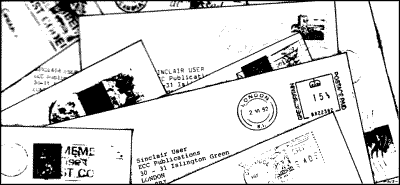| letters |
 Over-heating stops printerMY ZX-81 with 16K and printer arrived in mid-May from Sinclair. After two days I stopped 16K RAM wobble by putting a large tea-tray into an old cushion cover. The ZX-81, RAM and printer live permanently on the tray and there has never been any further trouble with wobble. Nearly every time I try to LLIST a long program, however, the power supply pack becomes very hot and eventually the printer goes dead, with white-out on screen. Moreover, it does not come alive again for several hours, i.e., until the power pack has cooled. This is no glitch or mains fluctuation. It happens at any time of day or night including 3 am - no K-cursor and no printer for several hours. Since my RAM pack is now free from wobble - and anyway, without touching anything except to unplug from the wall socket, a memory test shows 16K available when switched on again after the cooling period - the fault can be ascribed only to the power pack, which seems unable to cope with the printer for LLIST of more than 1K programs. My only solution at present is to copy long programs, screen by screen, with a long cooling period between each screen copy. Marion Stubbs Sinclair Research says that it has never met this problem previously but thinks it might be due to a heat-sensitive component in either the mains adaptor or the computer. Do readers have other suggestions? Contact made with flickerTHANK YOU for the machine code survey but I make two points: A tip? When typing-in programs if the machine is in FAST mode, the screen flicker tells one if a key has made "contact" more cheaply than buying beep systems - and just as effectively. The only thing is not to forget to revert to SLOW before SAVING, or you might produce a blank screen when the program is RUN. I want to know more about what machine code does. I want a better feel of what an address means - not just jargon by way of definition. I want to get behind the feel of hex and the mnemonics so that I can understand what I am doing. So how about some articles from people who can communicate their knowledge before I go out and buy another book? I want to be sure of understanding what I read. R J Redrup Thank you for your comments on machine code and we will be trying to deal with the points you make in future editions. Better munch saves battlesMY SONS and myself enjoy Sinclair User both for articles and programs - which I input and they use. The Monster Munch by Tim Hartnell - May, 1982 - however, almost resulted in a full-scale war when one of them discovered how to escape from the maze. If you are at either side of the board, you can escape using a two-part instruction, i.e., "NW". That transfers the 'H' to the E side of the board but the monster cannot follow. He is therefore safe so long as he travels "N" or "S". By adding the following, I cut off that escape route: 217 LET B$=B$+ "(SPACE)" 218 IF B$(2)="E" AND P>9 OR B$(2)="W" AND P<2 THEN GO TO 215 Now the monster always munches. Harold Cather Appeal for penfriendI WOULD like a pen-friend who has a ZX-81 with whom I can exchange programs and other things. Magnus Nygren Mains filter advisersWith regard to Paul Coker's letter in the July issue of Sinclair User, Display Electronics has a mains filter which it recommends for computers. T Dawson WITH REFERENCE to the letter from Paul Coker on mains spike suppression, in July, what is required is a transient suppressor. They can be obtained from a radio dealer and are supplied by Radiospares; the mains version is code 238-457. It is a small component which requires soldering across the mains at the input to the transformer in the power supply unit, which must, of course, be disconnected from the mains before dismantling. Although the loading of the Spectrum is far superior to the ZX-81, the Spectrum has a slight idiosyncrasy. You can have saved your programs on tape and loaded successfully many times when it apparently refuses to do so. The remedy is to ensure that your batteries are at full voltage; apparently when the voltage drops below the control voltage for the tape recorder motor stabilisation circuit, the speed of loading drops and the Spectrum notifies a tape loading fault. Replacing the batteries will cure the fault. F.Harrop |